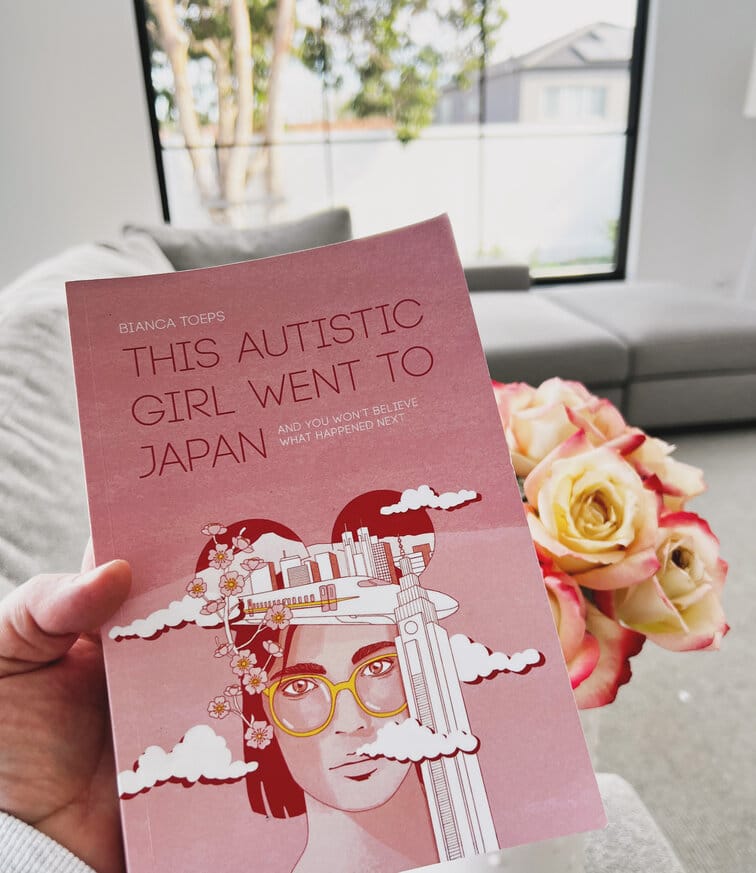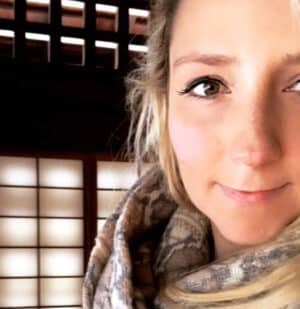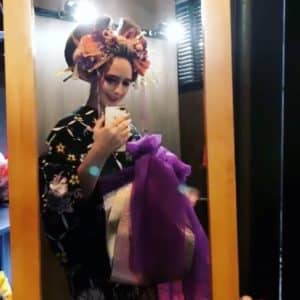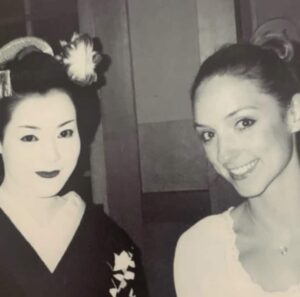
My interview with Bianca Toeps (I am so so so excited to share this with you all!)
I had the privilege of interviewing fellow Japanophile Bianca a few weeks ago after completely gobbling up her book “This Autistic Girl Went to Japan – and You Won’t Believe What Happened Next.” I couldn’t help being drawn to this book after also loving her earlier book“ But You Don’t Look Autistic at All” which tells the inspiring real life story of Bianca making the move to Japan, in spite of so many obstacles along the way – a major obstacle being a global pandemic. As someone who has lived in Japan for more than 13 years in total I loved following along with all the “oh so Japanese” elements of her story, her experiences as an Autistic woman living in, and moving to Japan. I also love how she talks about why she feels so at home now in her Tokyo apartment.
Speaking to Bianca, it is just so clear, immediately, just how intelligent and extremely creative she is. But she is also extremely kind (I was very nervous while interviewing Bianca and she was so patient with me babbling on!) Bianca is so vulnerable and open to sharing her experiences with all of us – which, unsurprisingly, makes for a fabulous author.
I highly recommend purchasing Bianca’s book “This Autistic Girl Went to Japan – and You Won’t Believe What Happened Next” and the audible version of “This Autistic Girl Went to Japan – and You Won’t Believe What Happened Next” here now.
You can also follow Bianca Toeps on instagram @biancatoeps

Photo credit: Bianca Toeps & Charlotte van Beusekom
Make-up: Charlotte van Beusekom
Jo: It’s so nice to meet you and it feels just so surreal as I’ve been reading your book this week – and now here you are! I particularly enjoyed reading your books as, while our stories are not exactly the same, there are many parallels when it comes to our Japan experiences. Although I didn’t have a global pandemic to reckon with, I also, at one point, had to leave Japan and go to Korea while waiting for a visa to come through so I was leaning into every word during that section of your book. And, while Korea is lovely, I was also like “But it’s not my Japan! It’s not my place.” I feel like I really understood what you were talking about.
Bianca: Yes! You have some of the food and you have some of the products and there is a Daiso but it is not the same one!
Jo: Well, first, I just really wanted to congratulate you on your book.
Bianca: Thank you.
Jo: It’s amazing. I know that the English translation came out a bit later so it may not feel so “new” to you anymore but it really did blow me away. I also really like your writing style. It’s very conversational but also some of it was almost instructional – helping us through all of the steps required and all of those obstacles you needed to overcome in order to properly move to Japan. Okay so my first question: Like you, I also fiercely love Japan but I also really love the colour pink! So much so that I really loved reading in your book how you made the sign on your office and your postbox pink. I wanted to ask – did your publishers give you any pushback at all on having a pink book cover for both of your books?
Bianca: Well, this is a really funny story, actually. Before I was with my current publisher, I was asked, by another publisher to write this book. So, after accepting, I immediately got to designing my cover. I was like “maybe this?” But that company first told me that I write too much like a blogger (which I was! So that made sense!) And then they told me “Hmm I think it’s too pink. We might exclude some readers if it has this much pink.” So it had started to become clear that this collaboration wasn’t an ideal fit and we clearly didn’t want the same things. So, I was ready to give up on the whole idea. However, a friend of mine convinced me to write the book anyway. She reassured me “this book is going to be so good and I know another publisher!” So, I sent off maybe a chapter of the book, including the cover design to a few more publishers, and the company my friend recommended immediately loved the concept and my cover.
I’ve also written an illustrated kids’ book and in that instance we decided on a reversible cover so the kids’ can decide which cover they would like to show when it’s on their bookcase. This idea was born from me wanting all of my books to line up nicely like a complete set.
Jo: Ohh. Any chance that picture book will also be translated into English at some point? I know a lot of people that would love to read it.
Bianca: Maybe in the future it will be…. So My first book “But you don’t look autistic at all” got its pink cover, the kids’ book has one, and when it came to this most recent book, I wanted this book to also match but this time I wanted Japanese objects all around me. So we pitched this idea to an awesome illustrator and she drew it. My Japanese teacher wrote a book about life as a Japanese person in the Netherlands, which was illustrated by the same girl. So I asked for her permission first, because I didn’t want to “steal” her illustrator.
Jo: I really love that. It may be just me, but I find that a lot of covers for books about or related to Japan are so clearly designed to appeal to a male audience. While I’m not saying “pink is for girls” but I do enjoy seeing a different option out there. I actually read your book “But you don’t look autistic at all” first and the colour palette and design really drew my eye to your book before even realizing that it had anything to do with Japan at all. I devoured that book and when you started talking about your love for Japan I was like “oooh! She loves Japan too!”
Bianca: I didn’t want the cover of the new book to look cliche, and I think we achieved that.
Jo: I actually was going to talk about this later but it’s the perfect time to discuss it right now, I think. In your book, I really enjoy how you take the time to dismantle a lot of the stereotypes and common troupes about life in Japan or what is perceived to be Japanese culture. I love how you bring up the buzz Japanese philosophy word “ikigai” and how your Japanese friend shot it down fast as “self-help” cliche in the West and only really ever leaving the mouths of old Japanese people on the very odd occasion. That made me giggle a lot. I also love how you broached that ever so clickbait-y trend of “Did you know you can buy an abandoned house in the Japanese countryside for less than US$10,000 !?” – when in reality, as appealing and incredible as that sounds, the idea itself is almost impossible to actually execute – particularly as a non-Japanese resident.
Bianca: Exactly! And the foundations may also be crumbling right there and then!
Jo: Yes. But, while you speak openly about these exaggerations on these “life in Japan” catch phrases, I love how, in your book, you never delve into, what is referred to in the expat circles in Japan as “Japan bashing” either. When writing in such detail about your Japan experience so far and especially all the admin required to get a visa and a place to live during covid, it could have been so easy to get swept up in the negativity. Those things can be so frustrating with all of the systems and hoops you had to jump through. How did you remain so patient and positive… and determined?
Bianca: Oh no…I wasn’t chill at all! When it was happening there were definitely times when I was ready to throw my phone. Like when I wanted to set up “PayPay” but it didn’t use the exact account name as on another document. Or when there was a problem because there was a space in my name but the Japanese form didn’t allow for spaces so it couldn’t be processed…. But then how can I make the names match…
Jo: When I’m interpreting for people who aren’t used to just how rigid (yet effective because they are so rigid) the systems in Japan can be – it can definitely be so hard to explain just exactly why things are the way they are.
Bianca: Right. People need to understand that. That if you follow the procedures your life will be so much easier. For example, people from the Netherlands might be like “well the idea and the essence of the information is all here. Can you just bend the rules this time because all you need is technically here?” “No! You should follow the rules in Japan. Even though it’s, technically, just for the sake of following the rules – which might not seem like it makes sense. But it does because it also means that the guy behind the counter processing the form can then check off a box. For my business I also quickly realized that I needed to learn how to play the game. “So, in order to get a visaI need to be a business manager, which means I need to hire people to manage and get an office? Ok. Yep. Did it. Next?” Do I have to hire 100 people, or get a huge office? No. Can the person doing the paperwork now check a box? Yes.
Jo: You know what. You’re so right and that’s a better way to explain it to others too. Because visitors to Japan talk about how reliable Japan is – “ I forwarded my suitcase and it arrived exactly when they said it would! Amazing!” And that is because the systems and the procedures are making a “promise” of sorts, right? But your part in this “promise” is to follow each of the required steps.
Bianca: Yes. So then every “box checker” has fulfilled their responsibility along the line, yes?!
Jo: Okay. I’m going to move on to my next question now. I was a student in Japan but after that I also had a time where I was on a job hunt, trying to work out which visa options I had within reach. So lots of that part of your story I found to be extremely relatable (and quite nostalgic). But I definitely wasn’t as determined to make it work as much as you seemed to be. At times, in your book, it almost felt like it wasn’t supposed to all work out… Have you always been this good at sticking to a goal no matter what?
Bianca: Well, I am very stubborn. Sometimes that’s a bad thing for me and I should just relax more. But, on the other hand, if I want something, I just go for it and try to make it work. During the pandemic it did all become a bit much for me as I kept saying to myself “Well, I can make this work! I just need to read all of the laws. Then I just need to find all of the loopholes…” But at some point I came to realize “Ohh wait…maybe there just aren’t any loopholes here. There is no rule or law I can get around. There is nothing I can do.” But then a few hours later, my brain was like “No! There has to be a way.”
Jo: Did you almost give up at any point?
Bianca: No. I was already “all in.” I didn’t have a house to go back to or anything. I had deliberately decided to go “all in.” I was like: “I have to do this.”
Jo: And that is why you are so successful.
Bianca: I think so but it’s also why I crash so hard sometimes.
Jo: After reading your first book, I did come to the second book for even more details about life in Japan as an Autistic person. I was drawn to all the little quirks and details of settling into life in Japan along your journey. However, in addition, I also thoroughly enjoyed reading just how clear you are on your personal boundaries and what you need to make the most of your own life and how not to get burnt out…To make the most of your work.
I have this theory about Japan, and I have zero research to back up my theory, but I would like to hear what you think…. I believe that a large proportion of Japanese people actually are Autistic – mostly because the “Japanese world” is just set up so beautifully for those who are sensitive to lots of noise – for example, the lovely quiet train carriage etiquette.. I’ve also lived in many Japanese homes with Japanese families and seen just how many family members really rely on that downtime to decompress and really go into their own worlds in order to return to school or the workplace setting the next day.
Bianca: Well, I once read an article (Bianca later confirms that this is the article she is referring to.) – it was in Japanese and I translated it in order to read it- and it talked about “kakure-asupe” which translates to something like “Hidden Aspergers”
Jo: Does that refer to people masking to the max then?
Bianca: Well, it said that they guess that approximately 1 in 20 people in Japan has “Hidden Aspergers.” So that meant that they didn’t know that they were themselves or they were hiding it. But I think there are two sides to this. I think that, if you are working in a Japanese company in Japan and you are autistic, you may function better compared to people in the West, because of how Japanese job are often structured – and so, in that way, you don’t run into problems. However, if you do run into problems, I feel that it is more difficult to deal with those issues. I think that this is because there is less knowledge out there.
Jo: I’m still learning and thinking a lot about this all so please forgive me if I have it wrong – but I don’t think it is still that common in Japan to share an Autism diagnosis in Japan openly. Do you think so too?
Bianca: I just recently met with a Japanese guy who’s a researcher on Autism in Japan. He also works for a Japanese publishing company. He has been working on some books for Autistic girls, actually. He spoke to me about how many of these girls can’t handle the school system anymore so they just stop coming to school. He spoke about trying to help these girls get back into school.
He spoke about it really nicely, actually. I actually plan to write a blog about this conversation with him at some point. It was so interesting. He spoke about the gap between “you can” and “you can’t” and how there is this whole space in between. He said “Ok so , at some point you can’t go to school anymore. Before that you could – but could you really? Because maybe you could go to school but then you couldn’t clean your house and you couldn’t shower and maybe you couldn’t cook…”
It was so interesting because he pointed out that, to an outsider, it might seem like “Look! You CAN go to school. You’re doing it!” but then no-one is taking into consideration the other aspects of that girl’s life while just focusing on turning up for class. So, I feel that maybe that is what you sometimes see in Japan. You might see the “gomi-yashiki,” you know, those people who hoard all of the garbage in their homes? I guess that could be a symptom for people. Maybe some of these people have a job but then they just cannot keep up because they have chosen to use all of their energy on their job -which is then going well. However, then their personal life is just… Well, a mess.
It’s actually interesting to use garbage as an example because of the garbage collection system here in Japan. I mean, I missed my bottle day last week and now I have to wait for another two weeks! So, I guess it happens quickly here. When you are too tired to deal with that kind of thing, it adds up.
Jo: This has got me thinking though. When I was an exchange student in Japan I was in “koko-ni-nensei” (the second year of senior high school) and, when I think back to everyday life at school, I now realize just how little room there was for anyone to be “different.” And this was at an all girls school in the countryside and there were just no allowances for anyone who may have needed some additional support.
But, then again, I contradict myself as, once the standard education years have passed in Japan I think there are many beautiful “devices” in place set up by Japan, as a society, to accommodate a neurodivergent community. So I’m still thinking a lot about this all.
If it’s ok. I would like to ask something. Autistic friends and family in my immediate vicinity are often very black and white in their responses to questions or just stating personal preferences. I would love to know how you find this all to work for you in Japan – a country where there is so much unspoken nuance in the way people talk to one another. For example, while learning about Japanese culture I was taught so much about the importance of “kuuki wo yomukoto” (the importance of reading the air.) If you don’t mind sharing, how does this all impact you and your life in Japan as an Autistic person?
Bianca: I’m probably quite bad at this, actually. But I guess that, since I’m a foreigner, I’m not expected as much to do that kind of thing. My Japanese friends are also very international – for example, one of them grew up in Spain and the other studied overseas – so these are Japanese people who are more open to different cultures and experiences. They kinda appreciate my directness, because it makes them feel like they can relax too. And if I’m ever too direct, they will tell me
Jo: Ahh I can relate to that as a lot of my Japanese friends who have spent time overseas are also so kind at letting me know if I make a cultural faux pas and tell me “Actually, that was the part where you were supposed to say XYZ.” So that is helpful for me too.
Bianca: I must also say that, as an Autistic person, that feeling is familiar to me even in the Netherlands. I often feel like I don’t understand what I was supposed to do! So it’s fine with me. I don’t work in a Japanese company. I did that on purpose. I just know that wouldn’t work well for me.As for when I’m just living my daily life out and about in Japan – on trains and stuff I really like the “script.” I feel like I communicate better here than I did in the Netherlands. This is because I know that the staff will be nice and they will follow the script too. I don’t care if it’s fake or not. I like how predictable it all is.
Jo: That is such a good point. Once you have the “Japan formula” down you can know what to expect. You walk into someone’s house and say “Ojamashimasu” and you know you’ve followed that script and done that bit. It is quite formulaic, isn’t it?
Can I ask, what is the coolest thing that has happened since becoming a published author?
Bianca: I probably give different answers to questions like this all the time, but I was recently asked by Disney to give a talk about Autism. I gave a talk in Amsterdam for the staff of Disney’s BeNeLux offices and it was amazing. But then a woman asked me what Disney has meant to me (and if you read my book you know about how important it has been to my story) so there I was, crying on stage. But they all seemed to like that – so that’s good!
Jo: That’s good and that’s so real too. I mean, Disney was one of the reasons you visited Japan in the first place, right?
Bianca: It was the only reason. Honestly. Well, my friend was there, Disney was there, and so I decided to go.
Jo: It’s a random question but do you still have your website for selling vintage clothes online like you mentioned in your book?
Bianca: Not really, since I have my Japanese company now. It would be so much more complicated tax-wise, compared to when I still lived in The Netherlands. I do still sell tote bags with the title of my book, but that’s it. Also because postal companies in other countries aren’t reliable like in Japan, and the SAL shipping system is no more either. I still like to buy cool stuff in Japan and sometimes I might sell a couple of cool finds on social media when I’m back in the Netherlands. But it’s not like a business thing.
Jo: In the book you spoke about finding out about places or systems in Japan that you had no idea existed until someone introduced you to them. Since writing the book, have you made any new realizations or discoveries in Japan?
Bianca: Let’s see. There’s a few things! First of all, there is a swimming pool a few hundred metres from my house. I still haven’t been there. I used to go to a fancy hotel to use the pool and a friend said to me “Wait! Don’t you have a pool just near you?” I’ve been walking past it almost daily with no idea.
I also just found a second hand website for buying and selling that I didn’t know about called Jimoti.
Jo: Am I allowed to ask what is next for you?
Bianca: I can now reveal that I am working on a planner! It’s a collaboration with a well-liked Dutch brand of planners called Structuurjunkie, and we will create a special version for autistic people, with which you can learn to manage your stimuli and gain more insight in how your brain handles things.
Initially the planner will be in Dutch, but we never know what the future brings…
In terms of what is next for my book, I do know that I would love to have Japanese translations of my books though. It’s a goal of mine, for sure. The Italian version of my first book just came out, and there is also a German and, of course, an English version.
I highly recommend purchasing Bianca’s book “This Autistic Girl Went to Japan – and You Won’t Believe What Happened Next” and the audible version of “This Autistic Girl Went to Japan – and You Won’t Believe What Happened Next” here now.
You can also follow Bianca Toeps on instagram @biancatoeps





